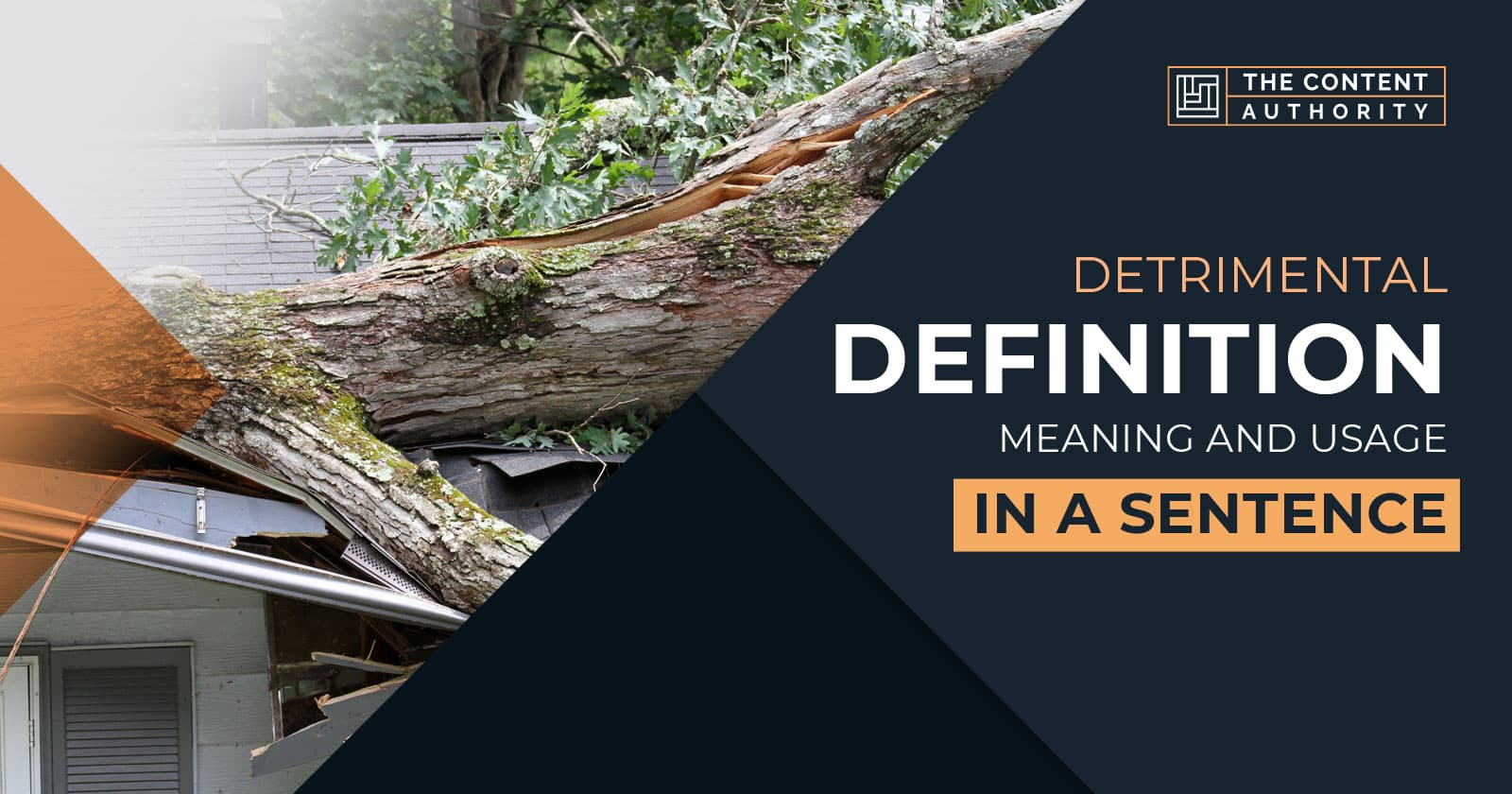Learning new words to add to your growing vocabulary makes your writing more colorful, presentable, and understandable. Have you ever achieved something or made a good decision for yourself, but it was terrible for someone else? The correct term to use in such a situation is detrimental; let’s now learn more about the detrimental definition, meaning, and usage.
Detrimental stems from detriment, which means harming or hurting someone due to a wrong decision. Detrimental applies in sentences when you want to refer to taking any action that will hurt other people. Words like harmful, hostile, nocuous, malignant, or pernicious are acceptable synonyms.
A word like detrimental is not hard to use; however, not knowing the word’s many definitions and uses will not allow you to use the word exhaustively. Luckily, this article will discuss all you need to know about detrimental definitions and meanings to help you use the word correctly in the future. Let’s get into it!
 What Is the Definition of Detrimental?
What Is the Definition of Detrimental?
Detrimental is defined as “engaging in an action that will cause grief, harm, or damage later.” That means you can use this word when someone is doing something wrong or dangerous that will have that person or others at a disadvantage.
For example, excessive smoking or drinking is detrimental to your health, meaning that drinking or smoking without limits will cause harm to your body. In this case, the extent of harm varies based on consumption levels. That means the word detrimental can be explained on a scale when used in some contexts.
Here’s the word detrimental in a sentence:
- Henry’s actions while in the local college were detrimental to his career and future.
- Russia’s decision not to back down in its war against Ukraine will be detrimental to the Russian people.
Does Detrimental Also Mean Bad Decision?
Detrimental is also defined as making a decision that negatively affects something or others. When something is described as detrimental, the decision taken will leave someone at a loss or a disadvantage. You’ll realize that people don’t just wake up and make such decisions; they are well-thought and analyzed.
For instance, a real estate company may win a court case to enable them to start their new project. However, that project damages the environment; it is detrimental to those living in the surrounding areas.
Here are some sentences to help you understand:
- The couple may have finally gotten their divorce, but it will be detrimental to their children.
- We all know that the ongoing court case is detrimental to Amer Herd’s acting career.
What Is the Meaning of Detrimental?
Detrimental also refers to something or someone undesirable or harmful. When referring to something or someone as harmful or dangerous to others, you can use the word detrimental. It can also be “an act that’s undesirable.”
You’ll realize that detrimental behaviors greatly harm society or the community. For example, corruption is generally considered harmful to a country’s economy and, thus, detrimental. Underdevelopment and unemployment are some of the effects of corruption.
Here are some example sentences:
- Adolf Hitler is one leader who many have described as detrimental to Europe during his reign.
- COVID-19 has proven a destructive and detrimental force that at one point almost brought the world to a standstill.
Is Detrimental a Negative Word?
Detrimental is a negative word used in situations that showcase a negative aspect. The primary definition of this word is “resulting in harm, damage or abomination.” That means it applies where there are adverse effects after a certain action. For instance, the sentence “Same-sex marriage is detrimental in most communities” means that the particular society doesn’t encourage it due to its effects on society.
Is Detrimental the Same as Negative?
With its negative connotation, people tend to assume that these two words have the same meaning. The truth is detrimental and negative are two different words. Detrimental means resulting in harm or damage, while negative means not positive; that is unwanted or bad. “Negative” can also be a mathematical number or a charge. The application in sentences also varies.
How to Use Detrimental in a Sentence
You can use the word detrimental as an adjective, adverb, and noun. Be sure not to confuse the various word forms because you’ll make your context hard for others to understand.
Detrimental As an Adjective, Adverb, and Noun
When used as an adjective, it describes the act of causing damage or harm to other people or things. For instance, a lack of adequate sleep can be detrimental to one’s life. In this case, the word detrimental is an adjective describing how inadequate sleep affects our lives.
Here are some example sentences:
- Remember to be careful not to make any silly mistakes that could prove detrimental to your academic career.
- I’m still baffled how a mere suggestion became detrimental to the company’s future.
When used as an adverb, the word changes to “detrimentally.” It describes how an action was undertaken in a manner causing harm, damage, or loss. For example, if something affects another, the action was detrimentally carried out.
Here are some example sentences:
- I find it hard to believe that the landlord’s move to reject the offer would detrimentally affect the construction plan.
- While we admit that this is an excellent proposal, further due diligence must be carried out to ensure no parties are detrimentally affected.
The word detrimental becomes a detriment when changed to a noun. When used in this form, it describes the state or quality of being or bringing harm or damage.
Here are some example sentences:
- The scientists found out that the tests carried out on the hamsters are detrimental to their health.
- Ashley decided to become an advocate for her co-workers, much to the detriment of her career.
10 Examples of Detrimental in a Sentence
The following ten sentences help you understand how to use the word in different situations correctly. Try making your sentences once you’re done reading the list below:
- Every student must remember that cheating on their exams is not a good idea and can prove detrimental to their school life.
- Rudy Gobert’s decision to mock the seriousness of the COVID-19 became detrimental to his relationship with his teammates.
- For the last decade, corruption has had a detrimental effect on the economy; however, new policies will change that.
- Humphries’ marriage to Kim is arguably the worst decision of his life to date.
- Continuous production of greenhouse gasses is detrimental to the environment; it leads to the melting of the polar ice caps.
- Some decisions seem like good ideas initially, but when not carefully analyzed, they can be detrimental in the long run.
- If only I had listened to my mother, I would not have suffered the detrimental effects of alcohol.
- Mike Knew that Russel Westbrook’s move to the Los Angeles Lakers would be detrimental to his career, but nobody listened.
- Nobody knew that a simple penalty kick could prove detrimental to Christian’s soccer career.
- A task force has been put in place to mitigate the detrimental effects of drug abuse in Detroit.
How Do You Spell Detrimental?
The word detrimental is spelled as d.e.t.r.i.m.e.n.t.a.l or \ ˌde-trə-ˈmen-tᵊl \ according to the International Phonetic Alphabet.
How Do You Pronounce Detrimental?
The best way to pronounce the word detrimental is [deh.truh.men.tl]
This word is quite simple to pronounce; however, you should remember that the “i” is silent and should not be pronounced. The best way to learn how to pronounce the word detrimental is by listening to an expert say the word. Next, break down the word into syllables and practice regularly.
Detrimental Synonyms
- Negative
- Hurtful
- Adverse
- Prejudical
- Unfavorable
Detrimental Antonyms
- Friendly
- Nice
- Positive
- Helpful
- Assisting
How Many Syllables Are In Detrimental?
The word detrimental has four syllables; det. ri. men. tal
Do you know that you can know the syllables in a word by monitoring your jaw movements? You will notice that your jaw drops four times.
 History & Etymology of Detrimental
History & Etymology of Detrimental
“Detrimental” comes from the word detriment, which traces its roots in the early 15th century from the Old French word détriment or directly from the Latin detrimentum, which means “to wear away” or “weaken.”
The word detrimental also comes from the Latin word detrimentum, which means to rub off. The prefix of the word detere means “to wear away,” derived from the root word “tere,” meaning “to rub or wear off.” The word detrimental later came up in the 1650s to define “injurious, harmful or likely to cause pain or damage.” The word was also used in 19th Century slang to refer to an ineligible suitor due to his financial situation.
When Was Detrimental First Used?
The first known use of detrimental as an English word dates back to 1590.
Conclusion
Learning a new word to improve your vocabulary or impress your friends is not bad. However, learning new words can be detrimental if you don’t know how to use them correctly. The best way to fully understand a word like “detrimental” is to constantly practice using the word in your writing and speech to gain confidence. Feel free to refer to this article whenever you encounter challenges using the word detrimental.
Shawn Manaher is the founder and CEO of The Content Authority. He’s one part content manager, one part writing ninja organizer, and two parts leader of top content creators. You don’t even want to know what he calls pancakes.

